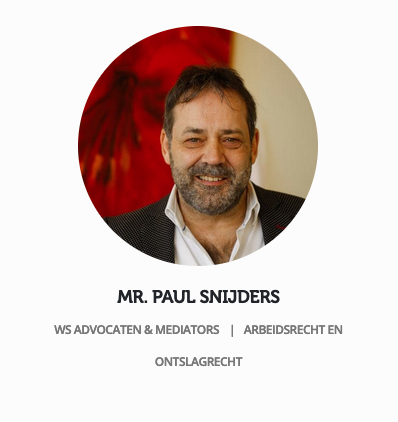 When does the Dutch 30% rule for expats end upon dismissal?
When does the Dutch 30% rule for expats end upon dismissal?
When the employment ends, the 30% ruling ends as well. If you are dismissed, you may be exempt from working during the last month(s). You will still receive your salary, but do not have to work anymore. What about the 30% ruling then, does the employment end when you no longer have to work or does it end at the end of the employment? In this article our labor lawyer, mr. Paul Snijders, answers this question based on a Dutch judgment.
The 30% ruling for expats
The 30% ruling is for employees who come from outside the Netherlands and work in the Netherlands temporarily. According to our labor law specialist, there are conditions that must be met. If so, expats do not pay income tax on up to 30% of their wages. This way, the Dutch government compensates them for the extra costs they incur to be able to work in the Netherlands. For example, extra travel costs and extra costs for housing and living expenses.
Expat must have expert knowledge
To get a good understanding of the rule, our employment lawyer will list the facts for you. With the 30% ruling, the Netherlands is trying to bring expert knowledge from abroad to the Netherlands. One of the conditions is that the employee has a specific expertise.
It is not always clear when exactly the 30%-ruling ends. The Amsterdam Court of Appeal made a judgment about this in 2021.
After working in the Netherlands for 8 years, the employee stopped working in January 2017. His employment contract ended in March 2017 and until then he was exempted from work.
Employment and Income Tax
According to the tax authorities, the man’s employment, and therefore also the 30% ruling, ended already in January 2017. The man, of course, disagreed and felt that his employment, and thus the 30% ruling, only ended on the same date as his employment contract. The tax authorities therefore consider whether or not actual work was performed to be decisive for the question of whether the 30% ruling still applies.
No actual work
Importantly, the court ruled that for the interested party, the 30% rule ended on February 28, 2017, as he no longer performed actual work as of January 18, 2017. We know from practice that the tax authorities often take the date of exemption as the date on which the 30% ruling actually ends. Nevertheless, the law (Article 10ec, paragraph 1 UB LB) states: ‘ends on the last day of the pay period following the pay period in which the employment ended’.
This applies both to exemption from work and to suspension and deactivation.
Garden leave
The judges agreed with the tax authorities and cited a Supreme Court ruling in support. According to our labor law specialist, the Supreme Court determined in that ruling that employment ends when the obligation to perform work has also ended.
This reasoning also fits the purpose of the 30% ruling. After all, the regulation relates to costs of living outside the country of origin, while the necessity of staying outside the country of origin for the employment ends as soon as the employee is exempted from working in the Netherlands.
Contact with an employment lawyer in Amsterdam about the 30%-ruling?
If you believe you have been unfairly laid off, you should contact WS Lawyers. Are you looking for involvement and a direct, personal contact with an experienced employment law specialist in Amsterdam? Call our specialized employment and dismissal lawyer for questions and legal advice on employment law, dismissal, transitional compensation or the 30% ruling.


